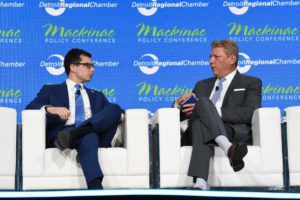Transportation Secretary Pete Buttigieg: No Time to Waste in the Transition to Full Electrification
June 1, 2022Key Takeaways
- The future of transportation is electrification and automated vehicles.
- No more time should be wasted in the complicated transition into full electrification as the transportation sector is a major contributor to greenhouse gases.
- We need to support our supply side to catch up and keep up with demand by keeping shipping costs under control and investing in local regions and businesses.
 Pete Buttigieg, U.S. Secretary of Transportation, shared what he foresees in the future of transportation, which includes much more and faster electrified and automated vehicles and updating language on regulatory frameworks. Further in his appearance at the Detroit Regional Chamber’s Mackinac Policy Conference Wednesday, he stressed the importance of building quicker momentum toward the complete but “complicated” transition to green energy without leaning on the status quo anymore.
Pete Buttigieg, U.S. Secretary of Transportation, shared what he foresees in the future of transportation, which includes much more and faster electrified and automated vehicles and updating language on regulatory frameworks. Further in his appearance at the Detroit Regional Chamber’s Mackinac Policy Conference Wednesday, he stressed the importance of building quicker momentum toward the complete but “complicated” transition to green energy without leaning on the status quo anymore.
“We literally don’t have time…I don’t know how much more bluntly to put it than the scientists have. But I would also add that a Great Lakes state is exceptionally vulnerable [to environmental impacts], even if you’re not near the water,” Buttigieg said. “The biggest sector contributing to greenhouse gases is transportation, and the most actionable part of that is [making it] electric.”
During his opening, he challenged Congress to match the work done by state leaders like Governor Gretchen Whitmer. He also interpreted his definition of succeeding in completing the Build Back Better initiative in Michigan, which includes a safer transportation system and creating family wealth for “millions of households,” and warned there may not be a second attempt if “this initiative fails.” According to Buttigieg, Michigan will receive at least $3 billion of the bill’s $100 billion of funding.
 Following his keynote address, Buttigieg sat with Devin Scillian, anchor of WDIV-TV, who immediately kicked off the conversation by commenting on the slow reactions to portions of the U.S. supply chain issue. Buttigieg mentioned how this problem was “building in this country for decades” and began collapsing during the first week of the pandemic.
Following his keynote address, Buttigieg sat with Devin Scillian, anchor of WDIV-TV, who immediately kicked off the conversation by commenting on the slow reactions to portions of the U.S. supply chain issue. Buttigieg mentioned how this problem was “building in this country for decades” and began collapsing during the first week of the pandemic.
“Supply chain problems have been building in this country for decades,” Buttigieg said. “The underinvestment in our transportation and infrastructure has left us vulnerable to shocks, and then we had the mother of all shocks, the pandemic, which was when the supply chain issues began.”
He referenced the long-term work that “should’ve been done in the eighties” is being completed now, including investing in national and local ports. As for short-term solutions, Buttigieg said his team is “engaging the private sector companies that own and operate most of the supply chain” to strengthen the public-private partnerships to ensure steadiness within the shipping system. He also cited the importance of shipping companies sharing more non-proprietary data with each other to improve the system as well.
Scillian continued the conversation by pressing the issue of price inflation, especially with gasoline. Buttigieg said the Biden Administration is focused on the “productive capacity of this country,” specifically when it comes to transportation, workforce, and raw materials, “to catch up and keep up” with today’s demands and lower shipping costs.
He also addressed more direct actions already being taken by the Biden Administration, including continuing the Strategic Petroleum Reserve and flexibility around ethanol. He suggested lowering costs in other financial categories, like insulin costs, to soften the financial blow for families when there’s a price spike again in gas.
